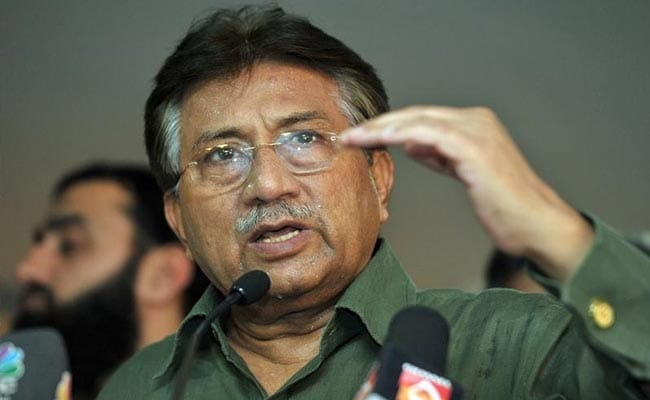
General Parvez Musharraf is being tried in a case for charges of high treason by a court in Pakistan. (File Photo)
Islamabad:
General Parvez Musharraf was today declared an "absconder" by a special tribunal trying the former Pakistani dictator for high treason as he failed to appear in person despite repeated summons and directed authorities to produce him before the court within 30 days.
The three-member court headed by Justice Mazhar Alam Khan Minakhel directed the government to publish advertisements in newspapers declaring General Musharraf an absconder, and also place similar posters outside the court and the former military ruler's residence.
The 72-year-old this month flew to Dubai for purported medical treatment after the Supreme Court lifted the ban on his foreign trips and it is believed that he may never return to face a slew of several high-profile cases against him.
The court - which had earlier asked the government to give a written explanation as to why it allowed General Musharraf to go abroad without its consent - declared him as "absconder" after he failed to appear in person despite several summons.
It also ordered the prosecutor to submit a record of all properties owned by the accused by the next hearing on July 12 besides directing the Federal Investigation Agency (FIA) to produce General Musharraf before the court within 30 days.
The court, that includes Justice Syeda Tahira Safdar and Justice Mohammad Yawar Ali as members, launched trial of Musharraf in 2013 for abrogating the constitution in 2007.
Such an act is considered as high treason under article 6 of the constitution, which is punishable by death.
General Musharraf came to power in a bloodless coup in 1999, deposing then-prime minister Nawaz Sharif. Facing impeachment following elections in 2008, he resigned as president and went into self-imposed exile in Dubai.
He returned in 2013 to contest elections but was implicated in several high-profile cases and was not allowed to leave the country. He is facing trial in illegal detention of judges, also in 2007.
In January 2014, General Musharraf suffered a "severe heart attack" on his way to a special court to face the high treason charges following which he was admitted to an army hospital.
General Musharraf has also been charged in connection with the 2007 assassination of prime minister Benazir Bhutto.
In January, he was acquitted by an anti-terrorism court in the 2006 murder case of Baloch nationalist leader Nawab Akbar Khan Bugti.
He had said before leaving Pakistan in March that he was going abroad to seek medical treatment for a spinal cord ailment which has now developed several complications and will "come back in a few weeks or months".
The three-member court headed by Justice Mazhar Alam Khan Minakhel directed the government to publish advertisements in newspapers declaring General Musharraf an absconder, and also place similar posters outside the court and the former military ruler's residence.
The 72-year-old this month flew to Dubai for purported medical treatment after the Supreme Court lifted the ban on his foreign trips and it is believed that he may never return to face a slew of several high-profile cases against him.
The court - which had earlier asked the government to give a written explanation as to why it allowed General Musharraf to go abroad without its consent - declared him as "absconder" after he failed to appear in person despite several summons.
It also ordered the prosecutor to submit a record of all properties owned by the accused by the next hearing on July 12 besides directing the Federal Investigation Agency (FIA) to produce General Musharraf before the court within 30 days.
The court, that includes Justice Syeda Tahira Safdar and Justice Mohammad Yawar Ali as members, launched trial of Musharraf in 2013 for abrogating the constitution in 2007.
Such an act is considered as high treason under article 6 of the constitution, which is punishable by death.
General Musharraf came to power in a bloodless coup in 1999, deposing then-prime minister Nawaz Sharif. Facing impeachment following elections in 2008, he resigned as president and went into self-imposed exile in Dubai.
He returned in 2013 to contest elections but was implicated in several high-profile cases and was not allowed to leave the country. He is facing trial in illegal detention of judges, also in 2007.
In January 2014, General Musharraf suffered a "severe heart attack" on his way to a special court to face the high treason charges following which he was admitted to an army hospital.
General Musharraf has also been charged in connection with the 2007 assassination of prime minister Benazir Bhutto.
In January, he was acquitted by an anti-terrorism court in the 2006 murder case of Baloch nationalist leader Nawab Akbar Khan Bugti.
He had said before leaving Pakistan in March that he was going abroad to seek medical treatment for a spinal cord ailment which has now developed several complications and will "come back in a few weeks or months".
Track Latest News Live on NDTV.com and get news updates from India and around the world

